- Home
- Roald Dahl
The Wonderful Story of Henry Sugar and Six More Page 16
The Wonderful Story of Henry Sugar and Six More Read online
Page 16
"Go away and brush your hair properly. And don't let it happen again or you'll be sorry."
"Let me see your hands. You have ink on them. Why didn't you wash it off last night?"
"Your tie is crooked, boy. Fall out and tie it again. And do it properly this time."
"I can see mud on that shoe. Didn't I have to talk to you about that last week? Come and see me in my study after breakfast."
And so it went on, the ghastly early-morning inspection. And by the end of it all, when the headmaster had gone away and Mr Pople started marching us into the dining-room by forms, many of us had lost our appetites for the lumpy porridge that was to come.
I have still got all my school reports from those days more than fifty years ago, and I've gone through them one by one, trying to discover a hint of promise for a future fiction writer. The subject to look at was obviously English Composition. But all my prep-school reports under this heading were flat and non-committal, excepting one. The one that took my eye was dated Christmas Term, 1928. I was then twelve, and my English teacher was Mr Victor Corrado. I remember him vividly, a tall, handsome athlete with black wavy hair and a Roman nose (who one night later on eloped with the matron, Miss Davis, and we never saw either of them again). Anyway, it so happened that Mr Corrado took us in boxing as well as in English Composition, and in this particular report it said under English, "See his report on boxing. Precisely the same remarks apply." So we look under Boxing, and there it says, "Too slow and ponderous. His punches are not well-timed and are easily seen coming."
But just once a week at this school, every Saturday morning, every beautiful and blessed Saturday morning, all the shivering horrors would disappear and for two glorious hours I would experience something that came very close to ecstasy.
Unfortunately, this did not happen until one was ten years old. But no matter. Let me try to tell you what it was.
At exactly ten-thirty on Saturday mornings, Mr Pople's infernal bell would go clangetty-clang-clang. This was a signal for the following to take place:
First, all boys of nine and under (about seventy all told) would proceed at once to the large outdoor asphalt playground behind the main building. Standing on the playground with legs apart and arms folded across her mountainous bosom was Miss Davis, the matron. If it was raining, the boys were expected to arrive in raincoats. If snowing or blowing a blizzard, then it was coats and scarves. And school caps, of course -- grey with a red badge on the front -- had always to be worn. But no Act of God, neither tornado nor hurricane nor volcanic eruption was ever allowed to stop those ghastly two-hour Saturday morning walks that the seven-, eight-and nine-year-old little boys had to take along the windy esplanades of Weston-super-Mare on Saturday mornings. They walked in crocodile formation, two by two, with Miss Davis striding alongside in tweed skirt and woollen stockings and a felt hat that must surely have been nibbled by rats.
The other thing that happened when Mr Pople's bell rang out on Saturday mornings was that the rest of the boys, all those of ten and over (about one hundred all told) would go immediately to the main Assembly Hall and sit down. A junior master called S. K. Jopp would then poke his head around the door and shout at us with such ferocity that specks of spit would fly from his mouth like bullets and splash against the window panes across the room. "All right!" he shouted. "No talking! No moving! Eyes front and hands on desks!" Then out he would pop again.
We sat still and waited. We were waiting for the lovely time we knew would be coming soon. Outside in the driveway we heard the motor-cars being started up. All were ancient. All had to be cranked by hand. (The year, don't forget, was around 1927/28.) This was a Saturday morning ritual. There were five cars in all, and into them would pile the entire staff of fourteen masters, including not only the headmaster himself but also the purple-faced Mr Pople. Then off they would roar in a cloud of blue smoke and come to rest outside a pub called, if I remember rightly, "The Bewhiskered Earl". There they would remain until just before lunch, drinking pint after pint of strong brown ale. And two and a half hours later, at one o'clock, we would watch them coming back, walking very carefully into the dining-room for lunch, holding on to things as they went.
So much for the masters. But what of us, the great mass of ten-, eleven-and twelve-year-olds left sitting in the Assembly Hall in a school that was suddenly without a single adult in the entire place? We knew, of course, exactly what was going to happen next. Within a minute of the departure of the masters, we would hear the front door opening, and footsteps outside, and then, with a flurry of loose clothes and jangling bracelets and flying hair, a woman would burst into the room shouting, "Hello, everybody! Cheer up! This isn't a burial service!" or words to that effect. And this was Mrs O'Connor.
Blessed beautiful Mrs O'Connor with her whacky clothes and her grey hair flying in all directions. She was about fifty years old, with a horsey face and long yellow teeth, but to us she was beautiful. She was not on the staff. She was hired from somewhere in the town to come up on Saturday mornings and be a sort of babysitter, to keep us quiet for two and a half hours while the masters went off boozing at the pub.
But Mrs O'Connor was no babysitter. She was nothing less than a great and gifted teacher, a scholar and a lover of English Literature. Each of us was with her every Saturday morning for three years (from the age of ten until we left the school) and during that time we spanned the entire history of English Literature from A.D. 597 to the early nineteenth century.
Newcomers to the class were given for keeps a slim blue book called simply The Chronological Table, and it contained only six pages. Those six pages were filled with a very long list in chronological order of all the great and not so great landmarks in English Literature, together with their dates. Exactly one hundred of these were chosen by Mrs O'Connor and we marked them in our books and learned them by heart. Here are a few that I still remember:
A.D. 597 St Augustine lands in Thanet and brings Christianity to Britain
731 Bede's Ecclesiastical History
1215 Signing of the Magna Carta
1399 Langland's Vision of Piers Plowman
1476 Caxton sets up first printing press at Westminster
1478 Chaucer's Canterbury Tales
1485 Malory's Morte d'Arthur
1590 Spenser's Faerie Queene
1623 First Folio of Shakespeare
1667 Milton's Paradise Lost
1668 Dryden's Essays
1678 Bunyan's Pilgrim's Progress
1711 Addison's Spectator
1719 Defoe's Robinson Crusoe
1726 Swift's Gulliver's Travels
1733 Pope's Essay on Man
1755 Johnson's Dictionary
1791 Boswell 's Life of Johnson
1833 Carlyle's Sartor Resartus
1859 Darwin's Origin of Species
Mrs O'Connor would then take each item in turn and spend one entire Saturday morning of two and a half hours talking to us about it. Thus, at the end of three years, with approximately thirty-six Saturdays in each school year, she would have covered the one hundred items.
And what marvellous exciting fun it was! She had the great teacher's knack of making everything she spoke about come alive to us in that room. In two and a half hours, we grew to love Langland and his Piers Plowman. The next Saturday, it was Chaucer, and we loved him, too. Even rather difficult fellows like Milton and Dryden and Pope all became thrilling when Mrs O'Connor told us about their lives and read parts of their work to us aloud. And the result of all this, for me at any rate, was that by the age of thirteen I had become intensely aware of the vast heritage of literature that had been built up in England over the centuries. I also became an avid and insatiable reader of good writing.
Dear lovely Mrs O'Connor! Perhaps it was worth going to that awful school simply to experience the joy of her Saturday mornings.
At thirteen I left prep school and was sent, again as a boarder, to one of our famous British public schools. They are not, of co
urse, public at all. They are extremely private and expensive. Mine was called Repton, in Derbyshire, and our headmaster at the time was the Reverend Geoffrey Fisher, who later became Bishop of Chester, then Bishop of London, and finally Archbishop of Canterbury. In his last job, he crowned Queen Elizabeth II in Westminster Abbey.
The clothes we had to wear at this school made us look like assistants in a funeral parlour. The jacket was black, with a cutaway front and long tails hanging down behind that came below the backs of the knees. The trousers were black with thin grey stripes. The shoes were black. There was a black waistcoat with eleven buttons to do up every morning. The tie was black. Then there was a stiff starched white butterfly collar and a white shirt.
To top it all off, the final ludicrous touch was a straw hat that had to be worn at all times out of doors except when playing games. And because the hats got soggy in the rain, we carried umbrellas for bad weather.
You can imagine what I felt like in this fancy dress when my mother took me, at the age of thirteen, to the train in London at the beginning of my first term. She kissed me good-bye and off I went.
I naturally hoped that my long-suffering backside would be given a rest at my new and more adult school, but it was not to be. The beatings at Repton were more fierce and more frequent than anything I had yet experienced. And do not think for one moment that the future Archbishop of Canterbury objected to these squalid exercises. He rolled up his sleeves and joined in with gusto. His were the bad ones, the really terrifying occasions. Some of the beatings administered by this Man of God, this future Head of the Church of England, were very brutal. To my certain knowledge he once had to produce a basin of water, a sponge and a towel so that the victim could wash the blood away afterwards.
No joke, that.
Shades of the Spanish Inquisition.
But nastiest of all, I think, was the fact that prefects were allowed to beat their fellow pupils. This was a daily occurrence. The big boys (aged 17 or 18) would flog the smaller boys (aged 13, 14, 15) in a sadistic ceremony that took place at night after you had gone up to the dormitory and got into your pyjamas.
"You're wanted down in the changing-room."
With heavy hands, you would put on your dressing-gown and slippers. Then you would stumble downstairs and enter the large wooden-floored room where the games clothes were hanging up around the walls. A single bare electric bulb hung from the ceiling. A prefect, pompous but very dangerous, was waiting for you in the centre of the room. In his hands, he held a long cane, and he was usually flexing it back and forth as you came in.
"I suppose you know why you're here," he would say.
"Well. I. . ."
"For the second day running you have burnt my toast!"
Let me explain this ludicrous remark. You were this particular prefect's fag. That meant you were his servant, and one of your many duties was to make toast for him every day at teatime. For this, you used a long three-pronged toasting fork, and you stuck the bread on the end of it and held it up before an open fire, first one side, then the other. But the only fire where toasting was allowed was in the library, and as teatime approached, there were never less than a dozen wretched fags all jostling for position in front of the tiny grate. I was no good at this. I usually held the bread too close and the toast got burnt. But as we were never allowed to ask for a second slice and start again, the only thing to do was to scrape the burnt bits off with a knife. You seldom got away with this. The prefects were expert at detecting scraped toast. You would see your own tormentor sitting up there at the top table, picking up his toast, turning it over, examining it closely as though it were a small and very valuable painting. Then he would frown and you knew you were for it.
So now it was night-time and you were down in the changing-room in your dressing-gown and pyjamas, and the one whose toast you had burnt was telling you about your crime.
"I don't like burnt toast."
"I held it too close. I'm sorry."
"Which do you want? Four with the dressing-gown on, or three with it off?"
"Four with it on," I said.
It was traditional to ask this question. The victim was always given a choice. But my own dressing-gown was made of thick brown camel-hair, and there was never any question in my mind that this was the better choice. To be beaten in pyjamas only was a very painful experience, and your skin nearly always got broken. But my dressing-gown stopped that from happening. The prefect knew, of course, all about this, and therefore whenever you chose to take an extra stroke and kept the dressing-gown on, he beat you with every ounce of his strength. Sometimes he would take a little run, three or four neat steps on his toes, to gain momentum and thrust, but either way, it was a savage business.
In the old days, when a man was about to be hanged, a silence would fall upon the whole prison and the other prisoners would sit very quietly in their cells until the deed had been done. Much the same thing happened at school when a beating was taking place. Upstairs in the dormitories, the boys would sit in silence on their beds in sympathy for the victim, and through the silence, from down below in the changing-room, would come the crack of each stroke as it was delivered.
My end-of-term reports from this school are of some interest. Here are just four of them, copied out word for word from the original documents:
Summer Term, 1930 (aged 14). English Composition. "I have never met a boy who so persistently writes the exact opposite of what he means. He seems incapable of marshalling his thoughts on paper."
Easter Term, 1931 (aged 15). English Composition. "A persistent muddler. Vocabulary negligible, sentences malconstructed. He reminds me of a camel."
Summer Term, 1932 (aged 16). English Composition. "This boy is an indolent and illiterate member of the class."
Autumn Term, 1932 (aged 17). English Composition. "Consistently idle. Ideas limited." (And underneath this one, the future Archbishop of Canterbury had written in red ink, "He must correct the blemishes on this sheet.")
Little wonder that it never entered my head to become a writer in those days.
When I left school at the age of eighteen, in 1934, I turned down my mother's offer (my father died when I was three) to go to university. Unless one was going to become a doctor, a lawyer, a scientist, an engineer or some other kind of professional person, I saw little point in wasting three or four years at Oxford or Cambridge, and I still hold this view. Instead, I had a passionate wish to go abroad, to travel, to see distant lands. There were almost no commercial aeroplanes in those days, and a journey to Africa or the Far East took several weeks.
So I got a job with what was called the Eastern Staff of the Shell Oil Company, where they promised me that after two or three years' training in England, I would be sent off to a foreign country.
"Which one?" I asked.
"Who knows?" the man answered. "It depends where there is a vacancy when you reach the top of the list. It could be Egypt or China or India or almost anywhere in the world."
That sounded like fun. It was. When my turn came to be posted abroad three years later, I was told it would be East Africa. Tropical suits were ordered and my mother helped me pack my trunk. My tour of duty was for three years in Africa, then I would be allowed home on leave for six months. I was now twenty-one years old and setting out for faraway places. I felt great. I boarded the ship at London Docks and off she sailed.
That journey took two and a half weeks. We went through the Bay of Biscay and called in at Gibraltar. We headed down the Mediterranean by way of Malta, Naples and Port Said. We went through the Suez Canal and down the Red Sea, stopping at Port Sudan, then Aden. It was tremendously exciting. For the first time, I saw great sandy deserts, and Arab soldiers mounted on camels, and palm trees with dates growing on them, and flying fish and thousands of other marvellous things. Finally we reached Mombasa, in Kenya.
At Mombasa, a man from the Shell Company came on board and told me I must transfer to a small coastal vessel and go on to Dar-es-Sala
am, the capital of Tanganyika (now Tanzania). And so to Dar-es-Salaam I went, stopping at Zanzibar on the way.
For the next two years, I worked for Shell in Tanzania, with my headquarters in Dar-es-Salaam. It was a fantastic life. The heat was intense but who cared? Our dress was khaki shorts, an open shirt and a topee on the head. I learned to speak Swahili. I drove up-country visiting diamond mines, sisal plantations, gold-mines and all the rest of it.
There were giraffes, elephants, zebras, lions and antelopes all over the place, and snakes as well, including the Black Mamba which is the only snake in the world that will chase after you if it sees you. And if it catches you and bites you, you had better start saying your prayers. I learned to shake my mosquito boots upside down before putting them on in case there was a scorpion inside, and like everyone else, I got malaria and lay for three days with a temperature of one hundred and five point five.
In September 1939, it became obvious that there was going to be a war with Hitler's Germany. Tanganyika, which only twenty years before had been called German East Africa, was still full of Germans. They were everywhere. They owned shops and mines and plantations all over the country. The moment war broke out, they would have to be rounded up. But we had no army to speak of in Tanganyika, only a few native soldiers, known as Askaris, and a handful of officers. So all of us civilian men were made Special Reservists. I was given an armband and put in charge of twenty Askaris. My little troop and I were ordered to block the road that led south out of Tanganyika into neutral Portuguese East Africa. This was an important job, for it was along that road most of the Germans would try to escape when war was declared.
I took my happy gang with their rifles and one machine-gun and set up a road-block in a place where the road passed through dense jungle, about ten miles outside the town. We had a field telephone to headquarters which would tell us at once when war was declared. We settled down to wait. For three days we waited. And during the nights, from all around us in the jungle, came the sound of native drums beating weird hypnotic rhythms. Once, I wandered into the jungle in the dark and came across about fifty natives squatting in a circle around a fire. One man only was beating the drum. Some were dancing round the fire. The remainder were drinking something out of coconut shells. They welcomed me into their circle. They were lovely people. I could talk to them in their language. They gave me a shell filled with a thick grey intoxicating fluid made of fermented maize. It was called, if I remember rightly, Pomba. I drank it. It was horrible.

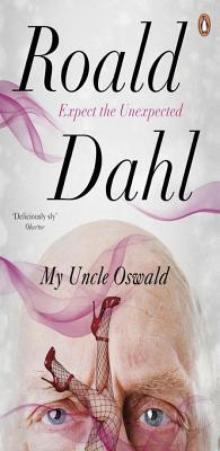 My Uncle Oswald
My Uncle Oswald The Best of Roald Dahl
The Best of Roald Dahl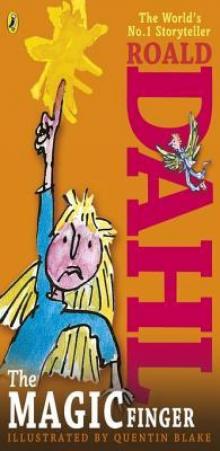 The Magic Finger
The Magic Finger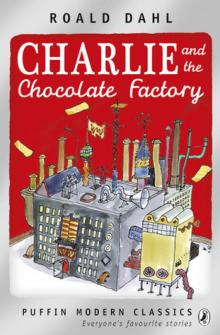 Charlie and the Chocolate Factory
Charlie and the Chocolate Factory Fantastic Mr Fox
Fantastic Mr Fox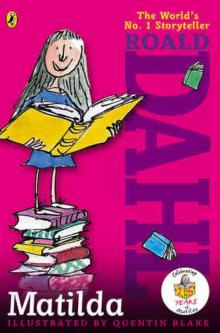 Matilda
Matilda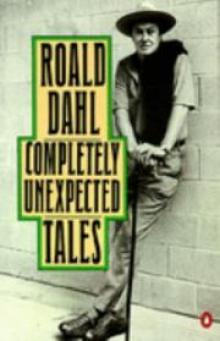 Completely Unexpected Tales: Tales of the Unexpected. More Tales of the Unexpected
Completely Unexpected Tales: Tales of the Unexpected. More Tales of the Unexpected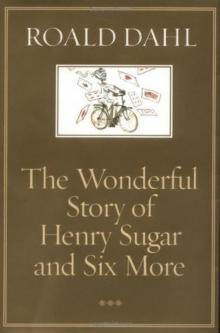 The Wonderful Story of Henry Sugar and Six More
The Wonderful Story of Henry Sugar and Six More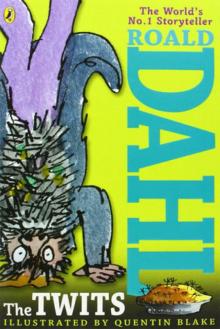 The Twits
The Twits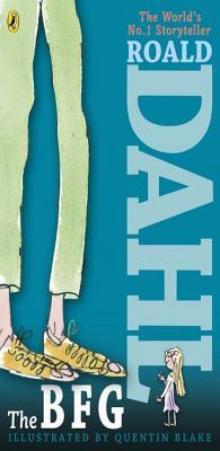 The BFG
The BFG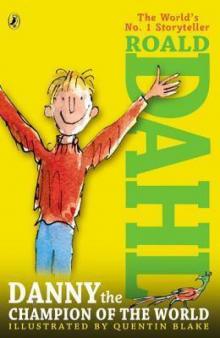 Danny the Champion of the World
Danny the Champion of the World The Witches
The Witches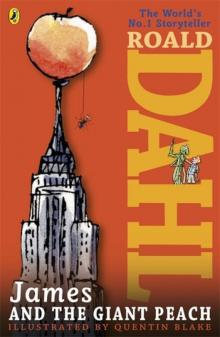 James and the Giant Peach
James and the Giant Peach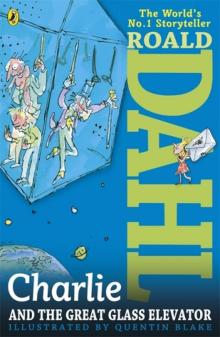 Charlie and the Great Glass Elevator
Charlie and the Great Glass Elevator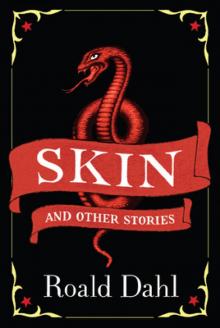 Skin and Other Stories
Skin and Other Stories Kiss Kiss
Kiss Kiss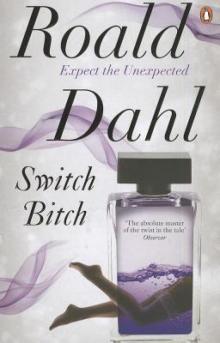 Switch Bitch
Switch Bitch The Giraffe and the Pelly and Me
The Giraffe and the Pelly and Me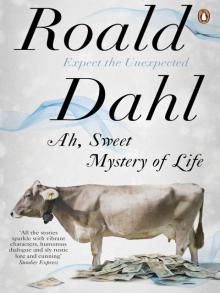 Ah, Sweet Mystery of Life
Ah, Sweet Mystery of Life Fear
Fear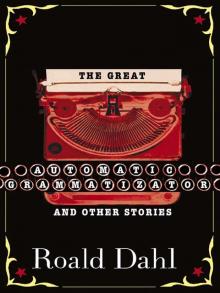 The Great Automatic Grammatizator and Other Stories
The Great Automatic Grammatizator and Other Stories Someone Like You
Someone Like You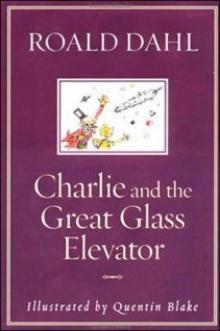 Charlie and the Great Glass Elevator c-2
Charlie and the Great Glass Elevator c-2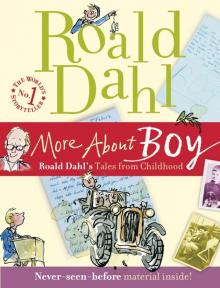 More About Boy
More About Boy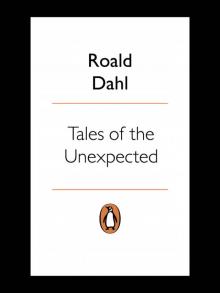 Tales of the Unexpected
Tales of the Unexpected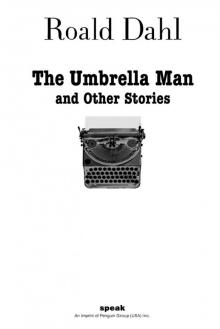 The Umbrella Man and Other Stories
The Umbrella Man and Other Stories Dirty Beasts
Dirty Beasts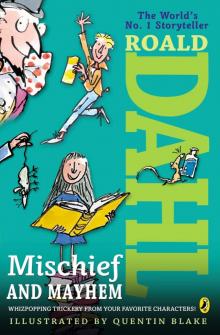 Roald Dahl's Mischief and Mayhem
Roald Dahl's Mischief and Mayhem The Collected Short Stories of Roald Dahl, Volume 1
The Collected Short Stories of Roald Dahl, Volume 1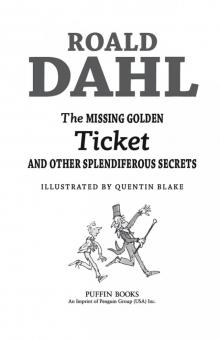 The Missing Golden Ticket and Other Splendiferous Secrets
The Missing Golden Ticket and Other Splendiferous Secrets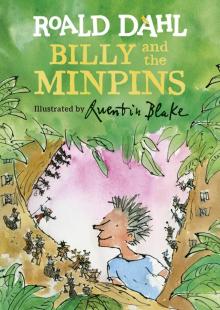 Billy and the Minpins
Billy and the Minpins Over to You
Over to You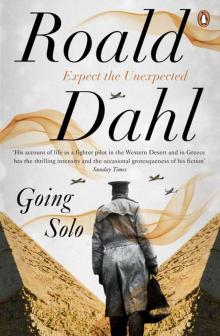 Going Solo
Going Solo Deception
Deception War
War Man from the South ee-3
Man from the South ee-3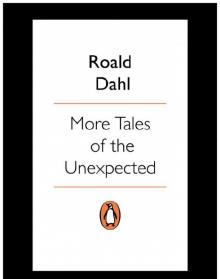 More Tales of the Unexpected
More Tales of the Unexpected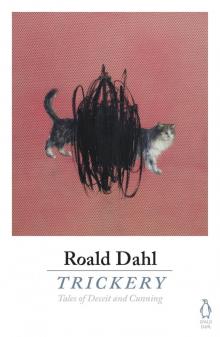 Trickery
Trickery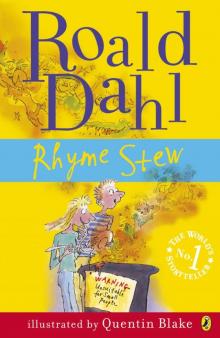 Rhyme Stew
Rhyme Stew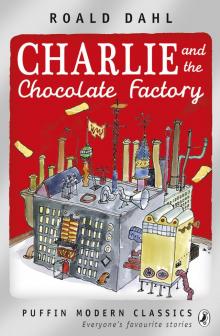 Charlie and the Chocolate Factory (Puffin Modern Classics relaunch)
Charlie and the Chocolate Factory (Puffin Modern Classics relaunch)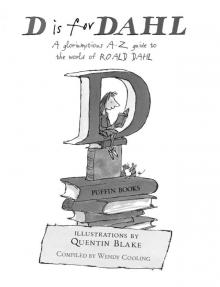 D is for Dahl
D is for Dahl Roald Dahl Whoppsy-Whiffling Joke Book
Roald Dahl Whoppsy-Whiffling Joke Book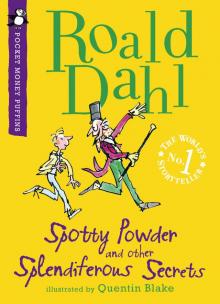 Spotty Powder and other Splendiferous Secrets
Spotty Powder and other Splendiferous Secrets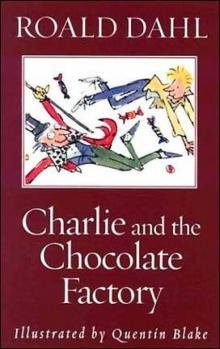 Charlie and the Chocolate Factory c-1
Charlie and the Chocolate Factory c-1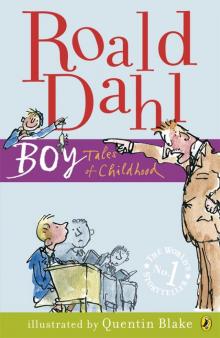 Boy
Boy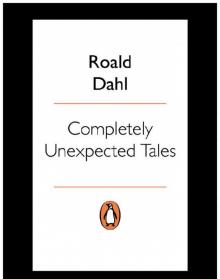 Completely Unexpected Tales
Completely Unexpected Tales Madness
Madness Innocence
Innocence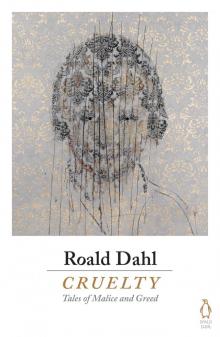 Cruelty
Cruelty George's Marvellous Medicine
George's Marvellous Medicine